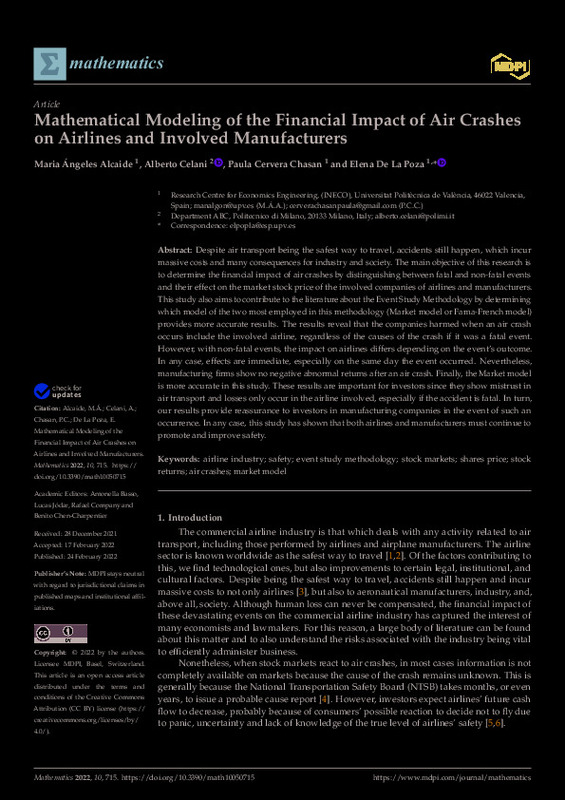JavaScript is disabled for your browser. Some features of this site may not work without it.
Buscar en RiuNet
Listar
Mi cuenta
Estadísticas
Ayuda RiuNet
Admin. UPV
Mathematical Modeling of the Financial Impact of Air Crashes on Airlines and Involved Manufacturers
Mostrar el registro sencillo del ítem
Ficheros en el ítem
| dc.contributor.author | Alcaide González, María Ángeles
|
es_ES |
| dc.contributor.author | Celani, Alberto
|
es_ES |
| dc.contributor.author | Cervera Chasan, Paula
|
es_ES |
| dc.contributor.author | De la Poza, Elena
|
es_ES |
| dc.date.accessioned | 2023-06-21T18:02:09Z | |
| dc.date.available | 2023-06-21T18:02:09Z | |
| dc.date.issued | 2022-03 | es_ES |
| dc.identifier.uri | http://hdl.handle.net/10251/194470 | |
| dc.description.abstract | [EN] Despite air transport being the safest way to travel, accidents still happen, which incur massive costs and many consequences for industry and society. The main objective of this research is to determine the financial impact of air crashes by distinguishing between fatal and non-fatal events and their effect on the market stock price of the involved companies of airlines and manufacturers. This study also aims to contribute to the literature about the Event Study Methodology by determining which model of the two most employed in this methodology (Market model or Fama-French model) provides more accurate results. The results reveal that the companies harmed when an air crash occurs include the involved airline, regardless of the causes of the crash if it was a fatal event. However, with non-fatal events, the impact on airlines differs depending on the event¿s outcome. In any case, effects are immediate, especially on the same day the event occurred. Nevertheless, manufacturing firms show no negative abnormal returns after an air crash. Finally, the Market model is more accurate in this study. These results are important for investors since they show mistrust in air transport and losses only occur in the airline involved, especially if the accident is fatal. In turn, our results provide reassurance to investors in manufacturing companies in the event of such an occurrence. In any case, this study has shown that both airlines and manufacturers must continue to promote and improve safety | es_ES |
| dc.language | Inglés | es_ES |
| dc.publisher | MDPI AG | es_ES |
| dc.relation.ispartof | Mathematics | es_ES |
| dc.rights | Reconocimiento (by) | es_ES |
| dc.subject | Airline industry | es_ES |
| dc.subject | Safety | es_ES |
| dc.subject | Event study methodology | es_ES |
| dc.subject | Stock markets | es_ES |
| dc.subject | Shares price | es_ES |
| dc.subject | Stock returns | es_ES |
| dc.subject | Air crashes | es_ES |
| dc.subject | Market model | es_ES |
| dc.subject.classification | ECONOMIA FINANCIERA Y CONTABILIDAD | es_ES |
| dc.title | Mathematical Modeling of the Financial Impact of Air Crashes on Airlines and Involved Manufacturers | es_ES |
| dc.type | Artículo | es_ES |
| dc.identifier.doi | 10.3390/math10050715 | es_ES |
| dc.rights.accessRights | Abierto | es_ES |
| dc.contributor.affiliation | Universitat Politècnica de València. Facultad de Administración y Dirección de Empresas - Facultat d'Administració i Direcció d'Empreses | es_ES |
| dc.description.bibliographicCitation | Alcaide González, MÁ.; Celani, A.; Cervera Chasan, P.; De La Poza, E. (2022). Mathematical Modeling of the Financial Impact of Air Crashes on Airlines and Involved Manufacturers. Mathematics. 10(5):1-18. https://doi.org/10.3390/math10050715 | es_ES |
| dc.description.accrualMethod | S | es_ES |
| dc.relation.publisherversion | https://doi.org/10.3390/math10050715 | es_ES |
| dc.description.upvformatpinicio | 1 | es_ES |
| dc.description.upvformatpfin | 18 | es_ES |
| dc.type.version | info:eu-repo/semantics/publishedVersion | es_ES |
| dc.description.volume | 10 | es_ES |
| dc.description.issue | 5 | es_ES |
| dc.identifier.eissn | 2227-7390 | es_ES |
| dc.relation.pasarela | S\455693 | es_ES |
| dc.subject.ods | 08.- Fomentar el crecimiento económico sostenido, inclusivo y sostenible, el empleo pleno y productivo, y el trabajo decente para todos | es_ES |
| dc.subject.ods | 09.- Desarrollar infraestructuras resilientes, promover la industrialización inclusiva y sostenible, y fomentar la innovación | es_ES |








